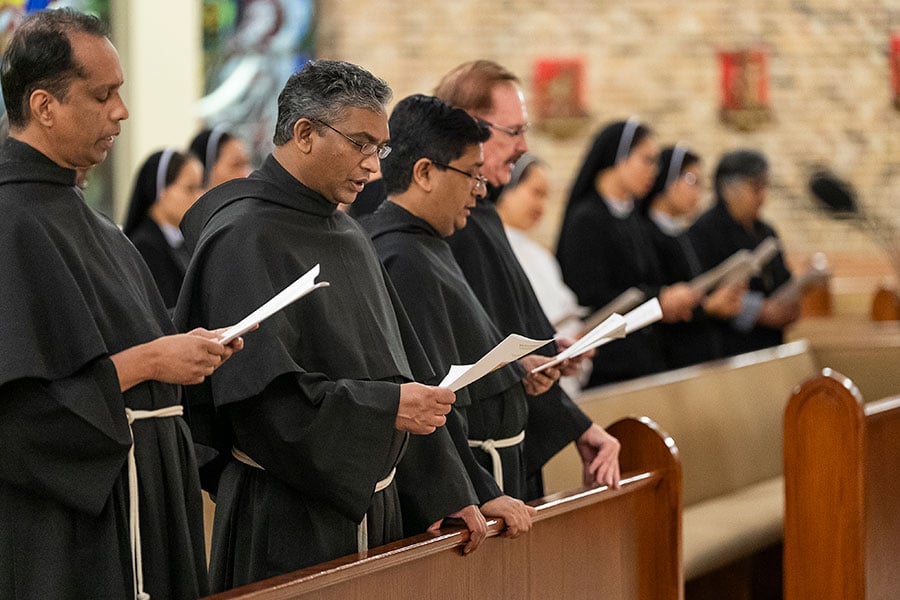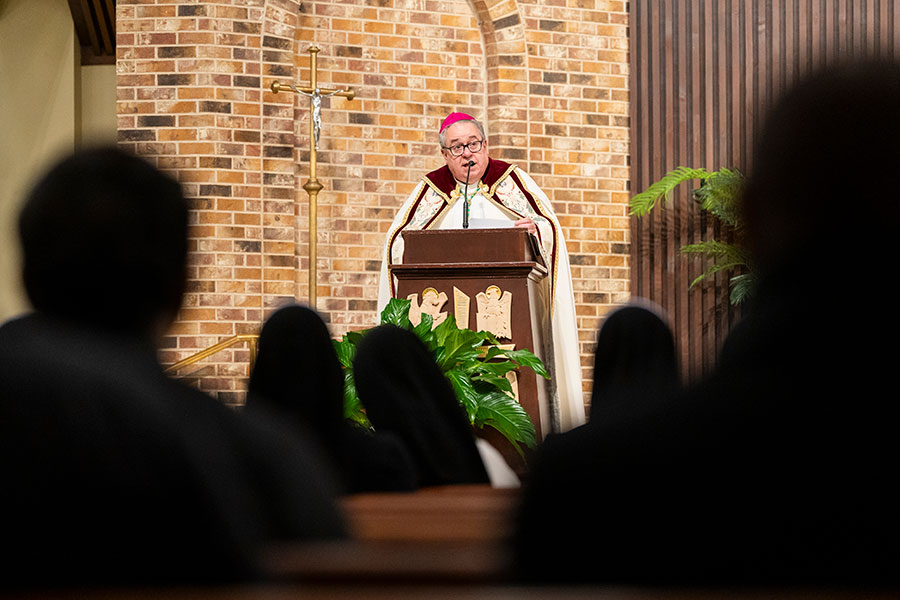Community of Devotion: The World Day of Prayer for Consecrated Life is celebrated in the diocese

Father Benjamin Hembrom, TOR, (second from left), and other religious order priests pray during Vespers at the World Day for Consecrated Life event hosted Feb. 2, 2024 at St. Bartholomew Parish in Fort Worth. (NTC/Juan Guajardo)
FORT WORTH — On a day where the world prays for vocations and for those who have discerned into consecrated life, 50 of the diocese’s religious men and women came together for an evening of vespers and fellowship on Feb. 2 at St. Bartholomew Parish in Fort Worth.
Mirroring the universal nature of the Church and the diverse population in the diocese, the liturgy of the hours was collectively prayed in three languages: English, Spanish, and Vietnamese.
During the vesper’s homily, Bishop Michael Olson described the importance of the consecrated community, calling their manifestation of compassion as “one of the particular graces … essential to a life of Christian holiness.” This compassion is cultivated, he said, in the intense prayer and study of Christ’s sacrifice.
“The concerned look on the face of one listening to another’s suffering, the kind gesture of an embrace in grief, the attentive presence to one falsely accused are all manifested in the sacrifice of the cross,” Bishop Olson said.
In a community of consecrated religious, “redemptive suffering through inconvenience [is] answered with patient and attentive listening with intentional presence.”
A consecrated religious first learns this compassion through their fidelity to prayer, beginning with those in their order.
“You need your sisters. Your sisters need you. You need your brothers, and your brothers need you. And we, the whole church needs you to need each other,” Bishop Olson said.

Transitioning his homily into Spanish, he discussed how Pope St. John Paul II had established a dedicated day for the Church to celebrate consecrated life. This day, he continued, has three objectives: to praise and give thanks to God for the gift of consecrated life, to promote knowing Him and His people, and to celebrate the joy God has given those who have given their lives to evangelization.
Bishop Olson ended his homily with a prayer in gratitude: “I join myself to the entire Church and to the diocese, thanking God for each of you and for the charism of your religious communities, for your presence here now and throughout your lives here, the many years that you have spent or your reason to arrive here. I thank God for you and especially for your gift of compassion.”
Obedient to God and order
At the cheerful reception held after the vespers, the consecrated religious quickly grouped up with others in their orders.
Sitting at a table full of the diocese’s Franciscan friars, Father Daniel Pattee, TOR, spoke on the vows he took as he followed God’s calling to his order.
“The thing about the consecrated life is the vows. That’s the key difference with consecrated life,” the parochial vicar at St. Andrew Parish in Fort Worth said. “I made three vows… poverty, chastity, and obedience. My provincial — I serve at his will at St. Andrew. He could move me anytime, so I’m in obedience. That really defines religious life.”
His vow of obedience can be relatable for married couples, too, he quipped. In a marriage, it is said that the man will be the head of the house, he recalled. “But it’s mutual subjection. I think St. John Paul II said with Christ in the Church, it’s a unilateral [relationship with God], but it’s not so with marriage. I’m always surprised to hear, ‘Hey, can you go here?’ ‘Well, I have to ask my wife.’ ‘Hey, can you go here?’ ‘I have to ask my husband.’”
Fr. Pattee believes that the sacrifice in maintaining chastity is one of the greatly misunderstood vows in the eyes of the secular world. He wondered why it should scare so many away from considering vocations when it is a virtue all should maintain before marriage, to the Church or otherwise.
Drawn to learning, Him
One who felt called at a young age, Sister Anne Frances Ai Le, OP, of the Dominican sisters, discussed how she felt drawn to consecrated life upon attending a Come and See program by her childhood Catholic community.
“I liked it and everything else I experienced, but I was still too young, my parents said,” Sr. Anne Frances said, adding she was in ninth grade at the time. In the next five years, Sr. Anne Frances graduated high school and entered college, and obedient to her parents and their ambitions for her future, she repressed her desire to return to the convent.
“I had started college, but I still had [the desire to join] in the back of my mind. I continued to pray on my own, but I kept thinking about it,” she explained.
Although she continued to focus on her studies and enrolled at Texas Christian University, her attention was still drawn to her faith. One to regularly excel in her studies, Sr. Anne Frances had to come to terms with God’s call.
“I had a religion class, and [in that semester] that was the only class I was making an A in. Everything else, I was making Bs. I would think to myself, ‘This is not how it’s supposed to be,’” she explained. “Even though I was trying to hide away from all of that, God was really using me, using that incident to sort of push me to discern once and for all. That’s how I interpret it, at least.”
Although education seemed to be what she ran from, it was also where she was headed. The Dominican Sisters, Sr. Anne Frances explained, is a worldwide order based in Vietnam, primarily focused on teaching.

“We are involved in education at various levels, elementary up to university, and we have sisters who are in health care as well,” she said.
The order’s dedication to education interested her, and having answered the call and entered the convent, she felt a pull to return to her studies and resumed making A’s and enjoying her learning again.
“God was really pushing me to use the gifts that He had given me to carry out the work that He had in mind for me,” said the sister, who celebrated a milestone anniversary of 25 years of professing her vows in 2022.
The assistant director of intellectual formation for permanent deacons for the diocese, Sr. Anne Frances has a Ph.D. in philosophy and a master’s in theology.
Always joy
One to find delight in all of God’s works, Friar Jose Felicano Torres Castro, OFM Cap, expressed his glee at the fellowship he experienced that night, “I’ve had a fabulous time.”
His order, the Capuchin Friars Minor was founded in Italy, Fr. Castro explained. They have orders in more than 100 countries, and more than 11,000 serve in places like India, Brazil, Italy, the Philippines, Argentina, Spain, and the United States.
Fr. Castro will be celebrating thirty years of making his vows this year on Aug. 23. As a priest, he celebrated an anniversary of 18 years on Feb. 6.
He hopes that the faithful remember that consecrated religious “devote ourselves to God before anything else, and to the people, but especially to the poor and those that society least appreciates. My Franciscan charism is to live in poverty, in joy — always joy, companionship, and for, of course, those most in need.”
A prayer for vocations
Leaving the celebration in equal amounts of happiness and peace, Sister Yolanda Cruz, SSMN, asked the diocese’s faithful to pray “for more vocations. More vocations to the religious life, to the priesthood, and especially to the sisters of Saint Mary of Namur.
“God has not stopped calling young women,” she continued. “And we do pray a lot for vocations, our sisters at the convent do, but a special intention is for young people to know that consecrated life is a viable option.”
